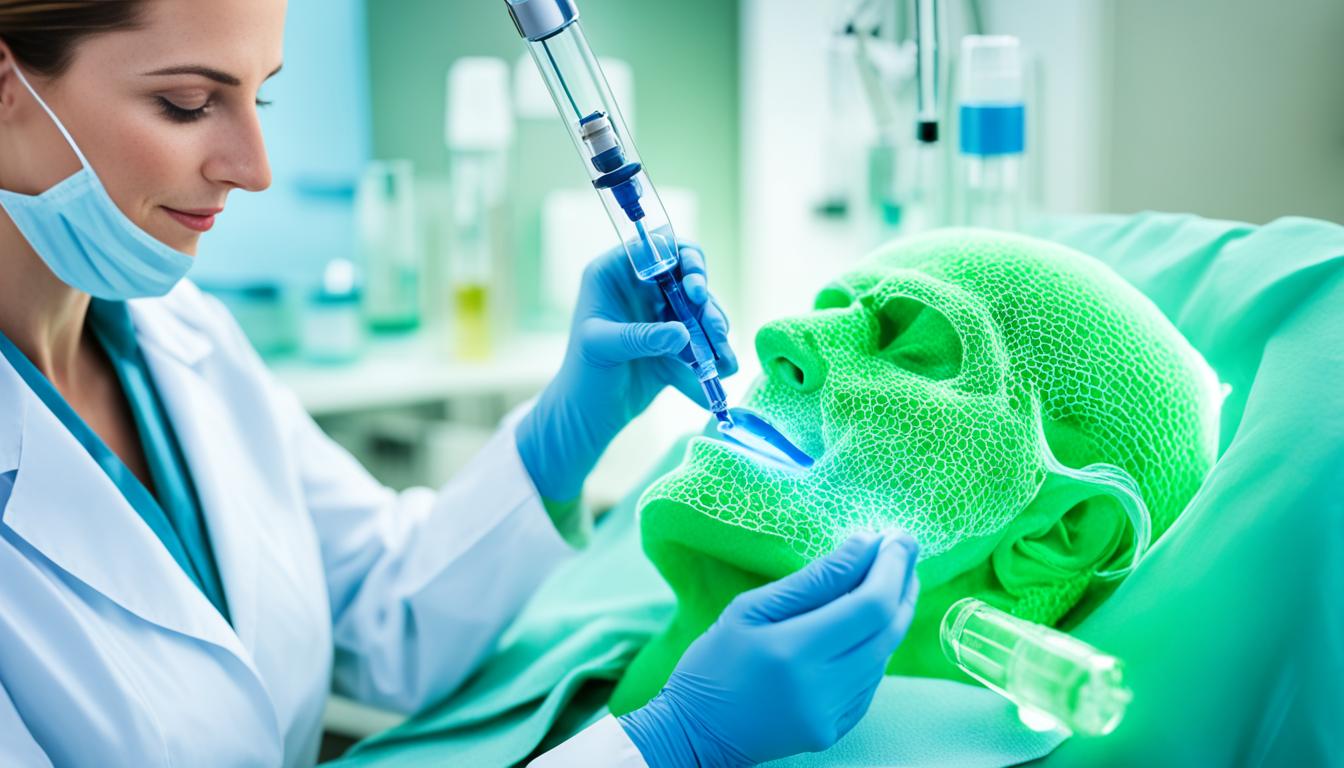Hyperthyroidism is when your thyroid gland makes too many hormones. This leads to many symptoms and issues. We’ll cover the signs, causes, how it’s found, and ways to treat it. Also, we’ll talk about using stem cells to combat it.
You might lose weight, eat more, or feel your heart race if you have hyperthyroidism. You could also be jumpy, easily irritated, and tired all the time. These signs can really affect how you feel and live.
Graves’ disease is often behind hyperthyroidism. It’s an immune issue where your body makes too many hormones. Other reasons include too much iodine, thyroid inflammation, or growths on your thyroid or ovaries/testes.
It’s crucial to catch hyperthyroidism early to avoid serious problems. These can range from heart issues to brittle bones. Your doctor will look at your history, check you over, and run some blood tests to spot it.
There are different ways to handle hyperthyroidism. Meds that lower hormone make-up might be used. Or, you might take a little radioactive iodine to calm your thyroid down. In some cases, removing all or part of the thyroid could be an option. Medicines to tackle symptoms, like fast heartbeat, can also help.
Looking into stem cells for treating hyperthyroidism is new but promising. Some studies suggest that certain stem cells might help fix thyroid problems. Researchers believe they could change into thyroid cells and work correctly. There’s a lot more to find out, though, to make sure this kind of treatment is safe and really works for people.
As we keep learning more about hyperthyroidism, new ways to diagnose, treat, and possibly cure it are coming up. This could mean better lives for those dealing with the condition.
Key Takeaways:
- Hyperthyroidism is a condition characterized by an overproduction of thyroid hormones by the thyroid gland.
- Symptoms of hyperthyroidism include weight loss, increased appetite, rapid heartbeat, nervousness, irritability, and fatigue.
- The most common cause of hyperthyroidism is Graves’ disease, an autoimmune disorder.
- Diagnosis involves a combination of personal and family medical history assessment, physical examination, and blood tests to measure thyroid hormone levels.
- Treatment options for hyperthyroidism include anti-thyroid medications, radioactive iodine therapy, surgery, and beta-blockers.
- Stem cell therapy shows potential in regenerating thyroid tissue and may offer a future treatment option for hyperthyroidism.
Treatment options for hyperthyroidism
There are many ways to treat hyperthyroidism. The best treatment depends on the main cause, how bad the symptoms are, and what the patient likes. Let’s look at the main ways to deal with hyperthyroidism.
1. Anti-thyroid medications
Methimazole and similar drugs can lower thyroid hormone development. They stop the thyroid from making too many hormones. This helps make symptoms better and gets the thyroid working normally again.
2. Radioactive iodine therapy
This method uses radioactive iodine to target the overactive thyroid. It kills the cells making too much hormone, leading to lower levels. After this treatment, patients might need to take thyroid hormones to make up for the reduced function.
3. Surgery (Thyroidectomy)
Sometimes, surgery to remove part or all of the thyroid is the best option. It is chosen if other treatments haven’t worked or for certain cases. Surgery can cause hypothyroidism, needing hormone supplements for life.
4. Beta-blockers
Beta-blockers help with symptoms like a fast heart rate and anxiety. They don’t solve the main issue but can make you feel better.
Each treatment has its good points and things to think about. It’s always best to talk to a doctor when choosing a treatment. Now, we’ll see a table that shows these options clearly:
| Treatment Option | Description |
|---|---|
| Anti-thyroid medications | Medications like methimazole that reduce thyroid hormone production. |
| Radioactive iodine therapy | Oral intake of radioactive iodine to destroy overactive thyroid cells. |
| Surgery (Thyroidectomy) | Surgical removal of all or part of the thyroid gland. |
| Beta-blockers | Medications that alleviate symptoms like rapid heartbeat and trembling. |
When picking a treatment, think of what caused your hyperthyroidism, your health history, and what you prefer. Your doctor can help you choose the best plan for you.
Stem cell therapy for hyperthyroidism
Stem cell therapy brings new hope for those dealing with hyperthyroidism. It’s a field still early in its research. Scientists are looking into using both embryonic and mesenchymal stem cells in these studies.
These cells can change into thyroid follicular cells. This ability shows great promise for treating thyroid disorders in animals.
Moreover, stem cell-derived exosomes have shown promise in treating different diseases. For example, they have helped with heart issues and liver damage. New findings hint they might also aid in rebuilding the thyroid.
But, we still need more studies to make sure stem cell therapy is safe and works well for hyperthyroidism in people.
With ongoing research, a future of new treatments for hyperthyroidism is on the horizon. Stem cells might just offer a more focused and powerful method. This could greatly change the lives of those with hyperthyroidism.

